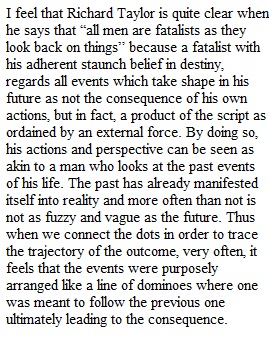


Q Richard Taylor suggests that, "A fatalist thus thinks of the future in the way we all think of the past, for all men are fatalists as they look back on things." Is Taylor clear about what he means by "all men are fatalists as they look back on things"? Does it make any difference, in looking back on things, whether we feel that we cannot do anything about the past, or could not have done anything about some past event? How might this distinction affect what Taylor says about the future?
View Related Questions